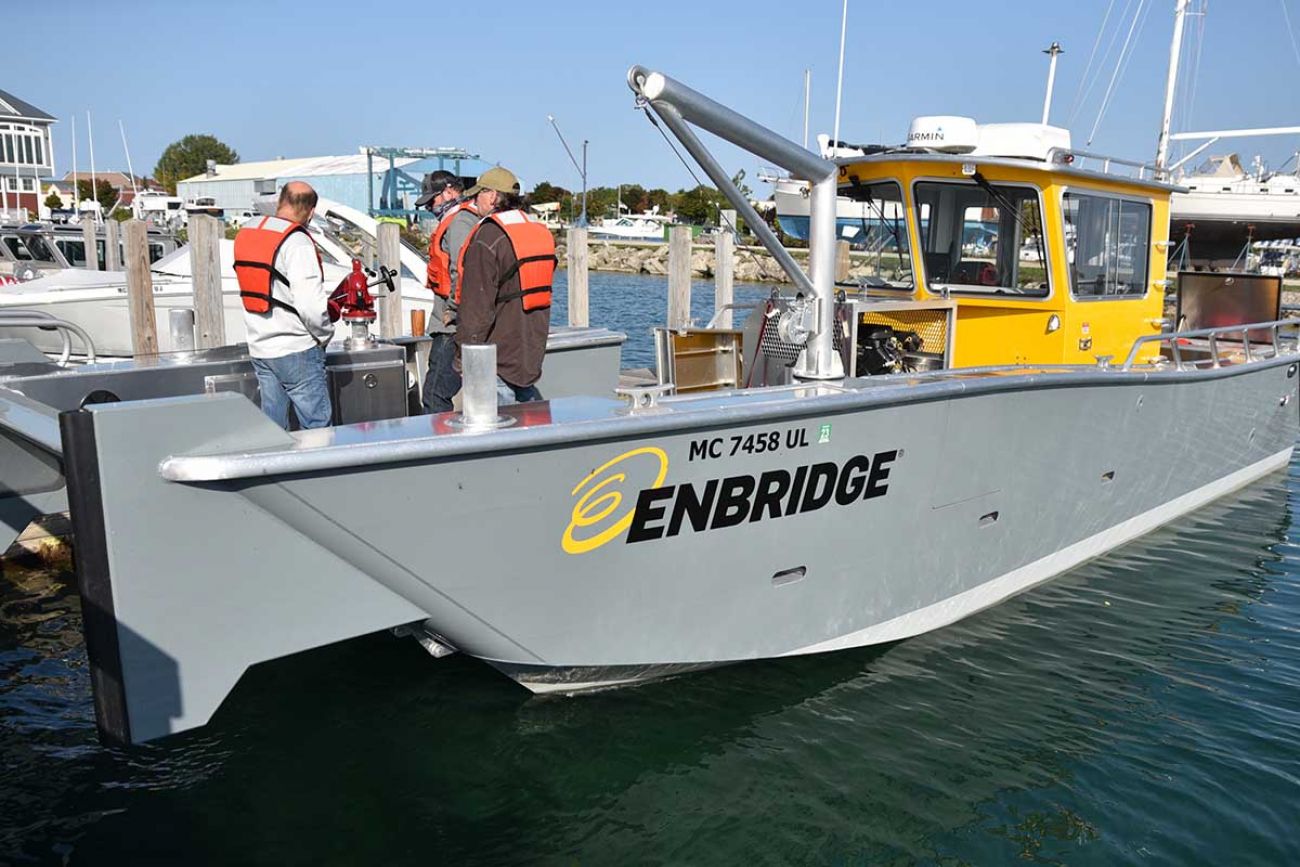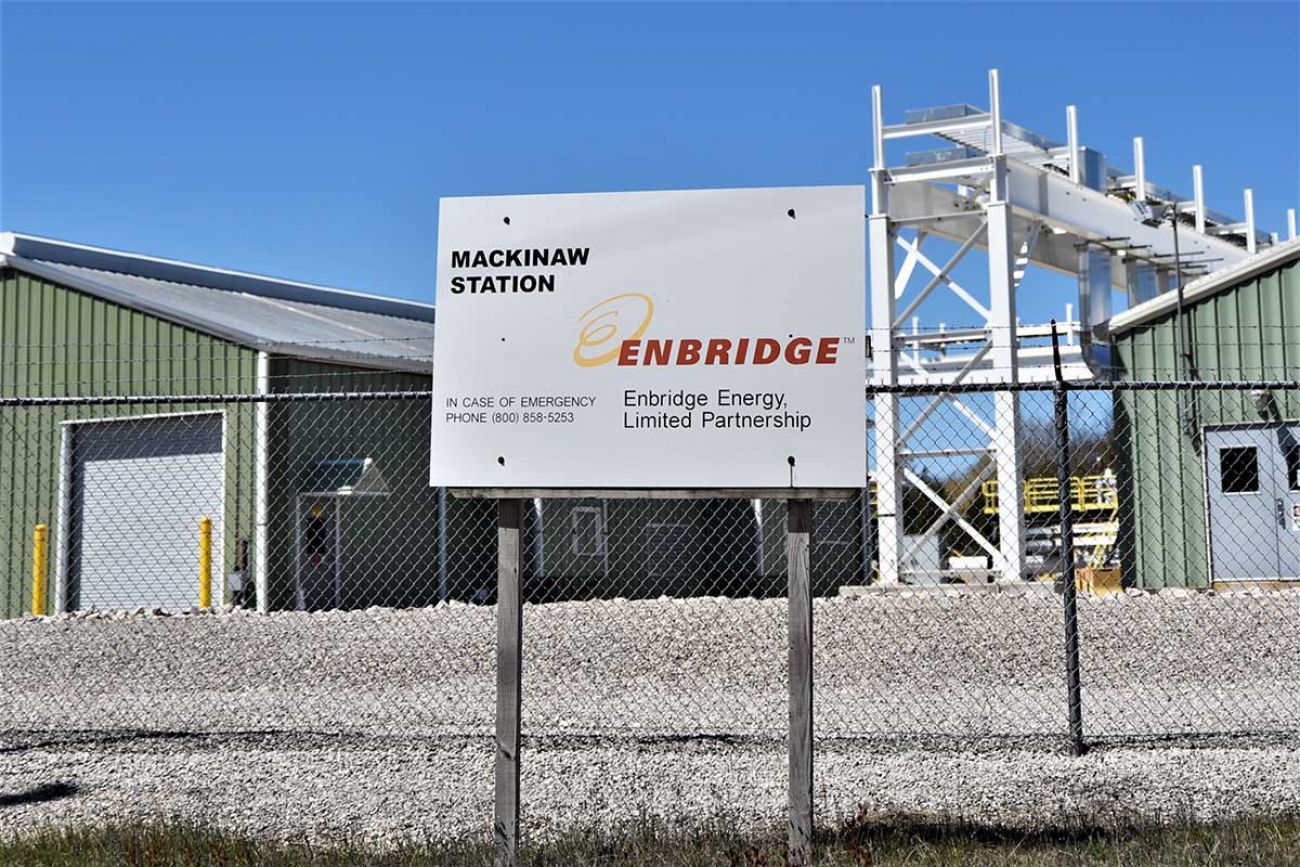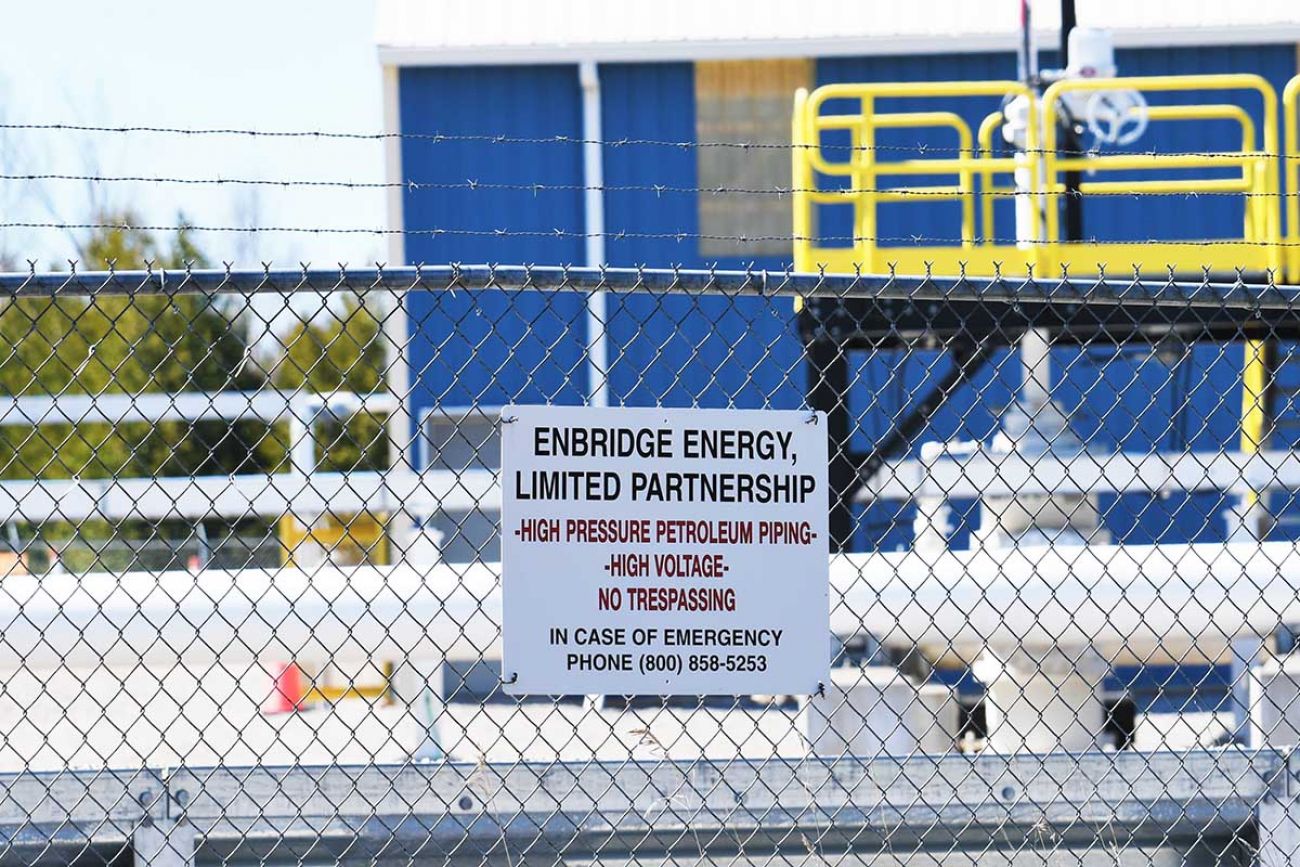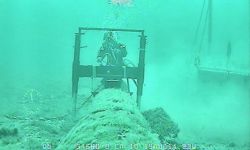Ignore the buzz, here’s why Enbridge Line 5 won’t likely close anytime soon


Anyone following recent national and international news about the Enbridge Line 5 pipeline could be forgiven for believing the pipeline might shutter any day now, with major implications for winter fuel prices.
But a year since Gov. Gretchen Whitmer ordered the pipeline shuttered over safety concerns, its future is no clearer today than it was then. Don’t expect that to change anytime soon.
In reality, legal experts and even key Line 5 foes say, any decision about the pipeline’s fate is likely months or even years away. That means barring a dramatic change, Line 5 will keep pumping oil through the winter while judges, diplomats and regulators fight over how quickly the aging pipes must vacate the Straits, and whether Enbridge should build a tunnel to replace them.
Related:
- Michigan tribes to Biden: Enbridge Line 5 threatens our treaty rights
- Hoping to avoid Enbridge Line 5 shutdown, Canada asks U.S. to negotiate
- Enbridge ordered to retrieve 15,000-lb. anchor from Straits of Mackinac
Michigan Radio’s Lester Graham and Bridge Michigan’s Kelly House set out to cut through recent political posturing and media speculation to provide some clarity on the dispute. Here’s what we found:
Line 5 is sticking around for now
Speculation has swirled about the pipeline’s fate since Politico reported earlier this month that the Biden administration is studying how a closure could affect regional fuel prices.
That sparked a flurry of responses from politicians, including Republicans who panned Biden for what they saw as an indication that the administration might unilaterally order a shutdown. Until then, battles over the pipeline’s fate had played out exclusively at the state level.
This article is part of The Great Lakes News Collaborative, which includes Bridge Michigan, Circle of Blue, Great Lakes Now at Detroit Public Television, and Michigan Radio. It unites newsroom resources to report on the most pressing threats to the Great Lakes and drinking water supplies, including pollution, climate change, and aging infrastructure. The independent journalism is supported by the Charles Stewart Mott Foundation.
But Biden’s staff have since made clear that they’re merely following through on a study of the proposed Line 5 tunnel that the U.S. Army Corps of Engineers announced months ago. As for potential unilateral action to close the pipeline?
“That is not something we are going to do,” said Karine Jean-Pierre, White House Deputy Press Secretary, during a press briefing last week.
The statement came a month after the Canadian government invoked a 1977 treaty that, in part, bars the U.S. and Canada from stopping the flow of international pipelines like Line 5. Canada invoked the treaty in an effort to defend Enbridge, the country’s biggest oil company, from Whitmer’s quest to shut down the pipeline.
That has forced the U.S. into forthcoming treaty talks, but Jean-Pierre told reporters that those talks “shouldn’t be viewed as anything more than that.”
Biden officials have made it clear that they are not eager to wade into Whitmer’s legal dispute with Enbridge, which began a year ago after Whitmer ordered Enbridge to shutter the 68-year-old pipeline, calling it a “ticking time bomb” that poses an unacceptable risk of an oil spill in the Straits.

Enbridge counter-sued, and ignored Whitmer’s May shutdown deadline.
Six months later, the case has yet to begin in earnest. Only this week did U.S. District Court Judge Janet Neff decide which court should hear the dispute.
Michigan had filed suit against Enbridge in state court, but Enbridge moved to remove it to federal court because, the company argued, pipeline regulation is fundamentally a federal concern. Neff sided with Enbridge, noting that the case raises major federal issues, both because Line 5 is now subject to a treaty dispute, and because it falls under the regulatory purview of the federal Pipeline and Hazardous Materials Safety Administration.
In a pipeline debate that has been deeply partisan, there’s another important difference between the two venues: Michigan’s Western District federal court is packed with Republican appointees, while the state Supreme Court has a narrow majority of Democratic appointees.
And, said Barry Rabe, a professor of public and environmental policy at the University of Michigan’s Ford School of Public Policy, federal courts tend to be more sympathetic to the authority of federal treaties.
“I do tend to think that federal treaties, however obscure and minimally used to date, are very powerful policy tools and that federal courts are reluctant to give states authority to ignore or overturn treaties,” he said.
A spokesperson for Michigan Attorney General Dana Nessel said she is reviewing Neff’s decision and considering next steps.
Because the two sides have yet to begin debating the shutdown order in court, any future resolution to the case months away at best, said Matthew Fletcher, director of Michigan State University’s Indigenous Law and Policy Center, who has been following the Line 5 case.
And the judge’s eventual decision is almost certain to be appealed by the losing party, further delaying any action, said Steven Ratner, Bruno Simma Collegiate Professor of Law at the University of Michigan and an expert in international law.
That means Line 5’s future could remain uncertain as Democrats Whitmer and Nessel vie for re-election, after staking their first term partly on vows to shut down the pipeline. And Enbridge is spending big money on attack ads against Whitmer.
Even if a judge sides with Michigan and orders the pipeline closed, it’s far from clear that it would trigger an immediate shutdown. Enbridge’s most vocal foes advocate for a gradual approach that gives Line 5 customers time to seek out other options.
The vast majority of the pipeline’s 540,000 barrel-per-day capacity is used to transport petroleum from Alberta to Ontario, Canada.
But about 30 percent of its light crude oil goes to refineries in Detroit and Toledo. And a small fraction of its natural gas liquids are siphoned off as propane to fuel the Upper Peninsula, a uniquely propane-dependent region where Enbridge estimates that Line 5 satisfies 65 percent of demand.
“We advocate for a phased transition away from Line 5,” said Mike Shriberg, executive director of the National Wildlife Federation's Great Lakes Regional Center. But Shriberg added that he believes that transition should start “right now.”
Biden wants to stay out of it...but that’s getting hard
The pipeline has become a complicated issue for the president, whose campaign messages of racial reconciliation and climate action earned him support from Native American tribes and environmental activists who want the pipeline shut down, while his pro-worker platform earned support from unions which support the pipeline and an Enbridge-proposed tunnel under the Straits of Mackinac to house it.
“It’s an impossible position,” said Fletcher, the MSU law professor. “There’s no real way to win — you have to pick one or the other. So what they’re going to try to do is not pick either.”
But that’s becoming increasingly difficult, due to Canada’s treaty invocation, mounting pressure from Michigan tribes who also hold treaty rights in the Straits, and Neff’s decision to keep the Line 5 lawsuit in federal court.

The tribes this month sent Biden a letter demanding a seat at the negotiating table with Canada, and called upon Biden to use his presidential power to unilaterally shutter the pipeline. At the very least, they argued, he should support his political ally Whitmer in her legal battle with Enbridge.
“Your Administration should not remain silent here,” the letter stated.
Aaron Payment, chairperson of the Sault Ste. Marie Tribe of Chippewa Indians, told Bridge the administration has yet to respond to the letter. He warned that if government leaders allow Line 5 to continue operating and disaster strikes, Michigan tribes could sue the state and U.S. government for any resulting damage to their treaty-protected fishing rights.
“If a spill happens,” he said, “we're going to look to hold whoever accountable that didn't do their job.”
Environmentalists, too, are pushing the Biden administration to pick a side on Line 5, fearing that Neff’s decision this week means the federal government, not Michigan, will ultimately decide the pipeline’s fate.
As for the upcoming treaty talks between the U.S. and Canada, Ratner told Bridge that their pace will depend upon just how aggressively Canada intends to defend Enbridge. A quick resolution, he said, is unlikely.
“The process in Washington could be pretty opaque for a while,” he said.
A state department spokesperson said only that the agency is studying various policy options in advance of the upcoming negotiations.
Fuel prices are high, but Line 5 has little to do with it
Anxiety over high fuel prices has become a wedge in the Line 5 debate, with Republican politicians including Michigan’s Tim Walberg and Jack Bergman writing to Biden earlier this month to warn that a pipeline shutdown could exacerbate ongoing fuel shortages “at a time when Americans are already facing rapidly rising energy prices, steep home heating costs, global supply shortages, and skyrocketing gas prices.”
But current high fuel prices have nothing to do with Line 5. Instead, they’re tied to rising energy demand as the economy continues to bounce back from COVID-19 shutdowns, coupled with scarce oil and natural gas supply as U.S. companies and overseas cartels keep production low.
Still, shutting down Line 5 now would worsen the problem, said Phil Flynn, an energy market analyst with the Price Futures Group in Chicago, particularly for Upper Peninsula residents who depend upon propane from Line 5 to heat their homes.
“It has the potential to have a ... risk of a shortness of supply of heating
propane this winter,” he said. “So if we get a cold winter, there could be actually people that die because they can’t get any heat.”
Flynn suggested gasoline prices could rise 3 to 5 cents a gallon if Line 5 shuts down. And studies have estimated that propane prices would rise anywhere from a few cents to more than 20 cents per gallon. That’s small in comparison to recent supply-driven price increases.
But Enbridge contends that a shutdown would also imperil regional refineries that rely on Line 5 — stress that would ripple downstream to their customers from the Detroit airport, which buys fuel from those refineries, to customers buying gas at the pump.
“Millions of people and thousands of businesses on both sides of the border are dependent on Line 5,” Enbridge spokesperson Ryan Duffy said in an email to Bridge.
Because neither Enbridge nor its refinery customers will say just how much they rely on Line 5, those claims are near-impossible to substantiate.
Line 5 opponents argue there are other ways to transport that fuel, such as truck, rail, or other pipelines that crisscross the Midwest. And they note that the U.S. economy is transitioning away from fossil fuels, making solar and geothermal-powered heat viable options for U.P. residents.
Still, an abrupt shutdown could leave Enbridge’s customers in a lurch, Shriberg said, which is why his group and Whitmer have both advocated for a phased shutdown.
Derek Dalling, executive director of the Michigan Propane Gas Association, said many U.P. propane suppliers have begun to adjust their business models, investing in rail and other transport options in case Line 5 stops flowing. But he said the U.P. remains heavily dependent upon the pipeline for the coming winter.
“To pull an existing pipeline offline without warning, that's just going to trigger a crisis and no one wants that,” he said. “I don't foresee that happening.”
The tunnel is still 7 years away, if it ever happens
While speculation swirls about the fate of the existing pipeline, Enbridge continues to pursue permits to relocate Line 5 inside a tunnel bored deep beneath the lakebed. But that project is years away from completion — assuming it happens at all.
When Enbridge struck a 2018 agreement with then-Gov. Rick Snyder, a Republican, to build the tunnel, the company estimated it could begin construction in 2021 and finish by 2024. In the years since, it became obvious that Enbridge would not meet that timeline.
Now, as Enbridge waits out tunnel permit review processes that could drag on for years, the company is telling prospective contractors to assume construction won’t start until 2024, at earliest. That timing could push tunnel completion out to 2028.
“Once we receive all permits, we are committed to start construction within the timeframe stated in the Tunnel Project Agreement,” Duffy said.
The U.S. Army Corps of Engineers announced earlier this year that it will conduct a thorough, time-consuming review of the proposed tunnel, known as an environmental impact statement. Those reviews, which require the Corps to consider alternatives to the tunnel project, can take an average of more than three-and-a-half years.
Meanwhile the Michigan Public Service commission, which must decide whether to let Enbridge relocate Line 5 inside the tunnel, has laid out a timeline that drags well into next year. And the Bay Mills Indian Community has challenged two permits issued by the Michigan Department of Environment, Great Lakes and Energy.
Environmentalists point to those delays as evidence that Line 5 must be shut down now. Allowing the 68-year-old pipes to remain in the lakebottom for another 7 years, they argue, is a risk Michigan can’t afford to take.
“The reality is that the economy is moving away from fossil fuels,” Shriberg said. If the pipeline won’t be complete for nearly a decade, “does anyone think it would be a good idea to invest a billion dollars (in tunnel construction) and keep the Great Lakes at risk for oil and natural gas in a decade from now, as we transition away from it?”
Unsurprisingly, Enbridge and its supporters argue just the opposite.
“It’s about the safest pipeline that there is,” said Mark Griffin, president of the Michigan Petroleum Association. “I would hope that instead of putting up obstacles, that the government would find ways to expedite and build the tunnel as safely and as quickly as possible.”
Michigan Environment Watch
Michigan Environment Watch examines how public policy, industry, and other factors interact with the state’s trove of natural resources.
- See full coverage
- Subscribe
- Share tips and questions with Bridge environment reporter Kelly House
Michigan Environment Watch is made possible by generous financial support from:
Our generous Environment Watch underwriters encourage Bridge Michigan readers to also support civic journalism by becoming Bridge members. Please consider joining today.
See what new members are saying about why they donated to Bridge Michigan:
- “In order for this information to be accurate and unbiased it must be underwritten by its readers, not by special interests.” - Larry S.
- “Not many other media sources report on the topics Bridge does.” - Susan B.
- “Your journalism is outstanding and rare these days.” - Mark S.
If you want to ensure the future of nonpartisan, nonprofit Michigan journalism, please become a member today. You, too, will be asked why you donated and maybe we'll feature your quote next time!




